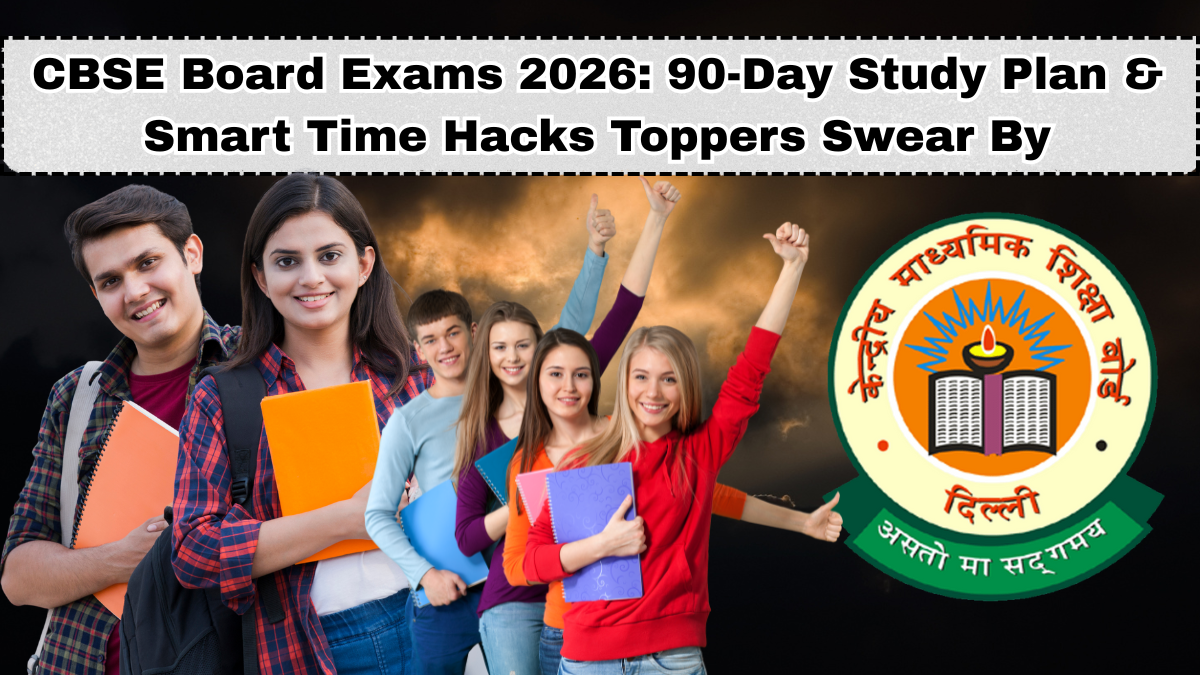With the academic year moving fast, students preparing for the CBSE Class 10 and 12 board exams are now entering the most crucial stretch. The competition is higher, the syllabus is vast, and distractions are everywhere—making the right CBSE board exams 2026 preparation tips more important than ever. Many toppers insist that boards are less about “studying more” and more about “studying smart.” A focused 90-day plan, consistent revision and NCERT mastery are the real foundations of score improvement.
The biggest challenge CBSE students face today is time management. With school hours, coaching classes, homework, sample papers, and social pressure, planning studies often feels overwhelming. But the truth is: 90 days are enough to turn an average student into a high performer, if used correctly. The key is discipline and structure. This guide breaks down study strategies, time-saving hacks, and step-by-step routines that toppers across India rely on.

Why NCERT Mastery Still Matters the Most
Before diving into the plan, every student must understand one crucial fact: CBSE exams are NCERT-driven. Regardless of reference books or coaching modules, the strongest preparation still comes from mastering NCERT—line by line, diagram by diagram, example by example. This is especially true for subjects like Science, Maths, Biology, Economics and Political Science. The CBSE board exams 2026 preparation tips being shared by toppers emphasise solving in-text questions and back exercises repeatedly.
Most high scorers highlight three reasons NCERT is non-negotiable:
• It helps understand the basics properly
• Many questions come directly or indirectly from NCERT
• It builds confidence for sample papers and PYQs
Once NCERT is complete, students can move to advanced questions for practice.
The 90-Day CBSE Study Plan (Proven by Toppers)
This is a simple, practical plan every student can follow regardless of school schedule.
Phase 1: First 30 Days – Syllabus Completion & Concept Clarity
• Finish the entire NCERT syllabus for all major subjects
• Make handwritten notes for difficult chapters
• Solve in-text questions after every topic
• Watch short concept videos only when stuck
• Don’t aim for perfection—aim for completion
Phase 2: Next 30 Days – Sample Papers + PYQs
• Solve one subject’s sample paper every two days
• Check the marking scheme after finishing
• Study CBSE Official Sample Papers closely
• Complete previous years’ board questions from 2018–2025
• Identify weak areas and revise them
Phase 3: Last 30 Days – Pure Revision
• Revise notes 2–3 times
• Focus on formulas, definitions, diagrams
• Solve 15–20 mock tests
• Practice writing full-length papers in 3-hour format
• Strengthen presentation and neatness
This structure prevents anxiety and ensures rotation-based revision.
Time Management Tricks That Actually Work
Most students lose marks not due to lack of knowledge but due to poor time usage. These smart hacks make preparation smoother:
• Use the 50-10 Rule: 50 minutes study + 10 minutes break
• Keep the phone in another room
• Study high-focus subjects (Maths, Physics) early morning
• Keep evenings for light subjects (English, SST)
• Maintain a “Doubt Book” to revise weak points
• Sleep 7–8 hours to improve memory retention
These strategies help you stay consistent for full 90 days.
Subject-Wise Preparation Blueprint
Maths
• NCERT Examples + Miscellaneous are MUST
• Keep a formula notebook
• Practice 10–15 questions daily
Science
• Revise diagrams and reactions
• Solve NCERT MCQs and Case Study Questions
• Watch quick recap videos during revision
English / Hindi
• Practice unseen passages
• Learn formats (letters, notices, reports)
• Improve handwriting and presentation
Social Science
• Make mind maps
• Memorise dates using associations
• Solve CBSE sample-based case studies
Commerce / Humanities (Class 12)
• Write answers in points
• Learn definitions exactly as in NCERT
• Solve numerical questions repeatedly
Students following these CBSE board exams 2026 preparation tips will see significant improvement in both speed and accuracy.
How to Stay Motivated and Avoid Burnout
Burnout is common during long exam prep. Use these techniques:
• Keep weekly goals instead of daily pressure
• Take one rest evening every week
• Celebrate small achievements
• Talk to parents/teachers when confused
• Avoid comparing your progress with others
Productive breaks strengthen the brain instead of slowing you down.
Common Mistakes Students Should Avoid
• Starting sample papers too late
• Memorising instead of understanding
• Ignoring NCERT diagrams, maps or graphs
• Not practicing writing full answers
• Studying without a timetable
• Last-minute cramming
Avoiding these mistakes increases confidence dramatically before the boards.
FAQs
How many hours should a CBSE student study daily?
Around 4–6 focused hours are enough with the right plan.
Are NCERT books enough for board exams?
Yes, NCERT is the backbone. Use reference books only for practice.
How many sample papers should I solve before 2026 boards?
At least 15–20 full-length papers across subjects.
What is the best time to study difficult subjects?
Morning hours between 5 am–10 am give maximum retention.
Can an average student score 90%+ in 90 days?
Yes, with a structured plan, NCERT mastery and consistent revision.
Click here to know more.
